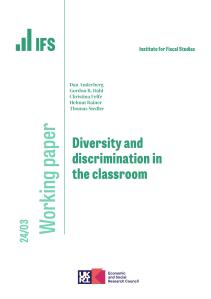June 16, 2004. That’s the date on the memo I sent to colleagues in the then Department for Education and Skills as I got ready to leave to take up a new role at the Treasury. Entitled Departing Thoughts, it contained a summary of some of what I thought I had learnt during my previous four years as chief economist.
Remarkably for an internal civil service memo, it still exists. Indeed, it is still wheeled out occasionally. For the sad truth is that seventeen years and nine secretaries of state later, most of what I put down on paper back then still rings horribly true. I thought about it again last week as I was delighted to agree to join the new Times Education Commission.
I made only five points in that memo. They’re not quite the same as the five I’d choose today, but they’d still make it into my top ten. So here they are.
First, policies that have an impact on students consistently and over a period of time are more effective and deliver better value for money than one-off policies. That’s actually the strong conclusion of recent research. Success builds on success, intervention on intervention. However, there’s little point, for example, improving outcomes for 11-year-olds if you don’t follow up and ensure that those improvements are maintained. We also have a system that we know doesn’t work for some. Among those pupils who don’t make it to the expected level at age 11, almost none go on to reach the benchmark achievements at GCSEs. We are setting them up to fail, and they know it.
Second, the school system puts too little focus on “non-cognitive“ outcomes. Call them “soft skills” or social skills or whatever you want, the things that really matter in life and in work — communication, teamwork, motivation, empathy — are too easily sidelined in an education system focused on exam results. The evidence that this is important, and increasingly so, is overwhelming. These aren’t merely nice to have. They matter in the labour market as well as in life. Happily, the evidence that these skills can be taught is also strong. A system that only measures exam passes is never likely to put enough focus where it really matters.
Third, inequality in educational outcomes is pervasive. The better off you are, the more likely you are to progress successfully. That’s not merely a difference between the poor, often defined as those entitled to free school meals, and the rest, although that is a big gap that matters. It’s true at every point up the income or social class distribution. In fact, the biggest gaps are often between the very best off and those just below. The privately educated do best. The richest pupils at state schools also do much better than their merely middlingly well-off peers.
Gaps in attainment start young and widen. Top performers from poor backgrounds tend to fall behind as they get older. Where gaps between groups have closed over time — for example, in proportions reaching expected levels at age 11, or getting five good GCSEs, or going to university — they tend to balloon out further up the system.
Getting five good GCSEs is no longer enough; the competition is to get the top grades. Getting to university isn’t enough; getting into a selective institution or going on to do postgraduate study is used as a way of marking yourself out from the crowd. So that’s how the better-off keep their position. Education, after all, is a positional good.
Fourth, we have an education system in which girls do far better than boys. Back in 2004, this was a gap that was already big and was a trend that had been emerging for a couple of decades. The gap remains. Girls outperform boys at every stage. They are about 30 per cent more likely than boys to progress into higher education.
There is, rightly, a lot of focus on those areas of maths, computing and engineering where girls are still underrepresented and there is definitely a problem of girls often picking less lucrative options post-16. However, the bigger story is of boys, and especially white working-class boys, being left behind. While we know that these educational inequalities are not reflected in the labour market, it surely should give us pause for thought that boys and girls do quite so differently at school.
Finally, I asked plaintively, what is going on between the ages of 16 and 21? We had then, and we still have, a weak and inconsistent offering for those not looking to go into university. Our lack of strong technical and vocational routes holds back both students and the economy. Uniquely in the world, our 16 to 18-year-olds specialise in only three subjects. The basic literacy and numeracy of our 16 to 24-year-olds are shocking. We live in just about the only country where this age group has worse basic skills than do older generations.
That is not a comprehensive list. It misses, for example, the role of teachers, the nature and value of our university system and the entire apparatus of GCSE exams, to name but a few.
It is true that we often expect too much of the education system. Unequal outcomes, for example, reflect much more than what happens in schools and colleges. Tackling many of these issues requires not only consistency of purpose across time but also across government. It is an abiding failure of our system of governance that, with an average tenure of less than two years, secretaries of state barely have time to understand the problems, let alone put in place lasting and effective reform.
This article first appeared in The Times, and is reproduced here with kind permission.








